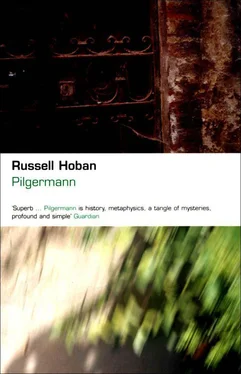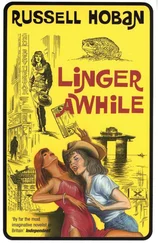Russell Hoban - Pilgermann
Здесь есть возможность читать онлайн «Russell Hoban - Pilgermann» весь текст электронной книги совершенно бесплатно (целиком полную версию без сокращений). В некоторых случаях можно слушать аудио, скачать через торрент в формате fb2 и присутствует краткое содержание. Год выпуска: 2002, Издательство: Bloomsbury Publishing PLC, Жанр: Современная проза, на английском языке. Описание произведения, (предисловие) а так же отзывы посетителей доступны на портале библиотеки ЛибКат.
- Название:Pilgermann
- Автор:
- Издательство:Bloomsbury Publishing PLC
- Жанр:
- Год:2002
- ISBN:нет данных
- Рейтинг книги:5 / 5. Голосов: 1
-
Избранное:Добавить в избранное
- Отзывы:
-
Ваша оценка:
- 100
- 1
- 2
- 3
- 4
- 5
Pilgermann: краткое содержание, описание и аннотация
Предлагаем к чтению аннотацию, описание, краткое содержание или предисловие (зависит от того, что написал сам автор книги «Pilgermann»). Если вы не нашли необходимую информацию о книге — напишите в комментариях, мы постараемся отыскать её.
Pilgermann — читать онлайн бесплатно полную книгу (весь текст) целиком
Ниже представлен текст книги, разбитый по страницам. Система сохранения места последней прочитанной страницы, позволяет с удобством читать онлайн бесплатно книгу «Pilgermann», без необходимости каждый раз заново искать на чём Вы остановились. Поставьте закладку, и сможете в любой момент перейти на страницу, на которой закончили чтение.
Интервал:
Закладка:
‘Yes,’ I said, ‘that’s true enough. But might not you also find it difficult to look me in the eye? Me and a few other Jews who lost their lives to the soldiers of Christ.’
‘I have already begged your forgiveness, have I not,’ said the tax-collector. ‘In front of your synagogue under the open sky in the sight of God have I humbled myself to the Jews.’
‘We were under the open sky because there was no roof to stand under,’ I said. ‘The synagogue had been burnt to the ground, and there were many Jews who could not attend because they were busy dancing with the maggots.’
‘Forgive me,’ he said. ‘Please, please forgive me. I would do it again if I had the chance.’
‘Do what?’ I said.
‘What I did,’ he said.
‘Ah!’ I said, ‘Do you now tell me that you brought those peasants to our town?’
‘Naturally I did,’ he said. ‘How was I not to do it?’
‘It was because of you that there were all those dead Jews on the cobblestones!’ I said, listening with dread and with fascination for the words that I knew must come next.
‘Indeed,’ he said. ‘Because of me and because of you.’
Hearing this I found that my throat was affected in such a way that I could not swallow. My mouth was so dry, my tongue so thick that I could scarcely speak. ‘Because of what I did,’ I said.
‘Yes,’ he said. ‘You are that Jew who finished me off. You are the last in a long succession of Jews who took away my life. Do you shake your head? No, you don’t, you know what I’m talking about. I was already dead some little while before this lout here took my head off, dead and Jew-killed. I saw you hanging about in the Keinjudenstrasse, I knew what was in your mind, I knew what would happen when I rode away. I made my arrangements, and once you were on that ladder death was on its way to the Jews of our town.’
‘Why the others?’ I said. ‘Why didn’t you just kill me?’
‘Killing you alone wouldn’t have been enough,’ he said. ‘Did you think you were the only one? There were always Jews, they were like owls that one hears calling in the dark: one close by, one farther away; you never see them but they know where you are. They smelt out Sophia the way Bodwild smelt you out, they smelt her lust and her appetite for the other, for the circumcised, for the lurking Jew. Could you possibly have thought you were the first one?’
Looking at that headless mass of maggots I felt the stare of his absent eyes, I began to see in the empty air the eyes of the dead man, his desperate eyes looking into my desperate eyes. ‘Yes,’ I said, ‘I thought that I was the first one.’
‘You weren’t,’ he said. ‘I could smell them always, smell them on her skin and on the silk she wore next to her skin, I could smell them in the bedclothes and in the folds of curtains, I could smell them in the passages of my house. They required no words, she and they, they made their wants known without language, like animals that go on all fours. Only a look, only a smell and they followed, like dogs running to mount a bitch in heat. A bitch in heat or a wild ass:
‘A wild ass used to the wilderness,
That snuffeth up the wind in her desire;
Her lust, who can hinder it?
All they that seek her will not weary themselves;
In her month they shall find her.’
That desperate man with no head had found the right words, the words that with a rush made Sophia freshly real in my mind, the desert animalness of her in the hidden flesh, the covered nakedness. Gone from me for ever, I knew that I was never to see her again. For a moment the loss of her closed in upon me so crushingly that I thought I might kill myself on the spot; it seemed all at once that there was no space, no time for me to live in. Yet here before me was her husband: he too had lost her and death had given him no rest; the memory of her was a wheel on which he was broken again and again. When was there an end of pain, I wondered. Never. The cup was golden and it would not pass from me. While I was alive I should have to drink it empty and when I was dead it would be there to drink afresh. And still I drink it now, newly bitter after all the centuries. But the pain is the life, the pain is what separates the animate from the inanimate, the human from the stone. What is human may long for the stone of its innocence, the stone of its ease, of no pain; but the pain is the life. Even after death the pain is the life. This pain is not a simple one, it is complex.
Was there pain before there was a world? Was the world brought forth in pain? Yes, I am sure of this, I am convinced that it is so. What knowledge can there be of this? As these words come on to the paper by way of what goes by the name of Pilgermann I note that theoretical science has worked its way back deductively to the very first moments of the universe and the bursting forth of everything from the time-space singularity which had contained it just before that moment. All of this is imprinted on the waves and particles of me, it is in the mystical black letters that rise above all flames, it is the Word that is at once the birth-scream and the death-cry of the cosmic animal that is God, the It that is both creator and created. How should there not be pain? One has only to listen to music run backwards to sense the reversing cycles of consummation and creation, the continual ordering and reordering of the disturbance that is the endless idea that continually thinks itself into and out of the manyness of its being.
It is not from the loss of Sophia, the loss of Christ and the loss of God as He that the pain comes, no. It is from the pain that God comes, that Christ with his lion-eyes comes, that Sophia in all her beauty, her splendour, and her passion comes. It is from the cosmic intolerable of the nothing-in-everything alternating with the everything-in-nothing that all things come. This great pain, this ur-pain, swims its monstrous bulk in deeps far down, down, down below that agony of loss in which I grind my teeth remembering the golden bell of Sophia’s nakedness and the sharpness of the knife of joy.
Knife of joy. At this thought almost do the waves and particles of me laugh. Perhaps this almost-laugh is seen somewhere as the shaking of a leaf in the evening wind, the shaking of a leaf seen in the light of a street lamp under a humpbacked moon in a modern place where the few trees speak to the dry stone. ‘Knife of joy,’ I said, and immediately there came to mind the knife of unjoy, the knife that drew the line for me. Now of course I know what I did not know then: I know that the pain waits in the joy as the dragonfly waits in the nymph. Almost I sense that the joy, as the nymph to the dragonfly, is a necessary stage in the development of the pain.
With my dead colleagues I was on the road to Jerusalem: with the sow Bodwild and her peasant master Konrad; with the bear shot full of arrows by his worshipper; with Udo the relic-gatherer; with the tax-collector the husband of Sophia, and with us was Bruder Pförtner in his appearances and his disappearances. And now I became aware of perhaps someone else, it was only the faintest light and shadow as it were sketched on the air, a ghostly chiaroscuro walking familiarly with the rest of us as if by right. This sketchy figure was in truth familiar, uncertain of feature as it was: it was immediately recognizable to me as an early state of my death. I felt drawn to it as a father to a son. This simulacrum was in no way childlike, it was a fully-grown duplicate of me but not yet fully defined, not yet fully realized, and therefore it was to me as a child to be looked after.
Child! Looking at my immature death, feeling protective towards it as if it were my son, I found myself thinking: What if Sophia and I have made a child! What if in her womb is growing new life from our sin, our adultery, our triumph! I laughed aloud as this thought leapt up in me. I looked sidewise at the tax-collector, my brother in Sophia. ‘In her month they shall find her,’ I said.
Читать дальшеИнтервал:
Закладка:
Похожие книги на «Pilgermann»
Представляем Вашему вниманию похожие книги на «Pilgermann» списком для выбора. Мы отобрали схожую по названию и смыслу литературу в надежде предоставить читателям больше вариантов отыскать новые, интересные, ещё непрочитанные произведения.
Обсуждение, отзывы о книге «Pilgermann» и просто собственные мнения читателей. Оставьте ваши комментарии, напишите, что Вы думаете о произведении, его смысле или главных героях. Укажите что конкретно понравилось, а что нет, и почему Вы так считаете.












